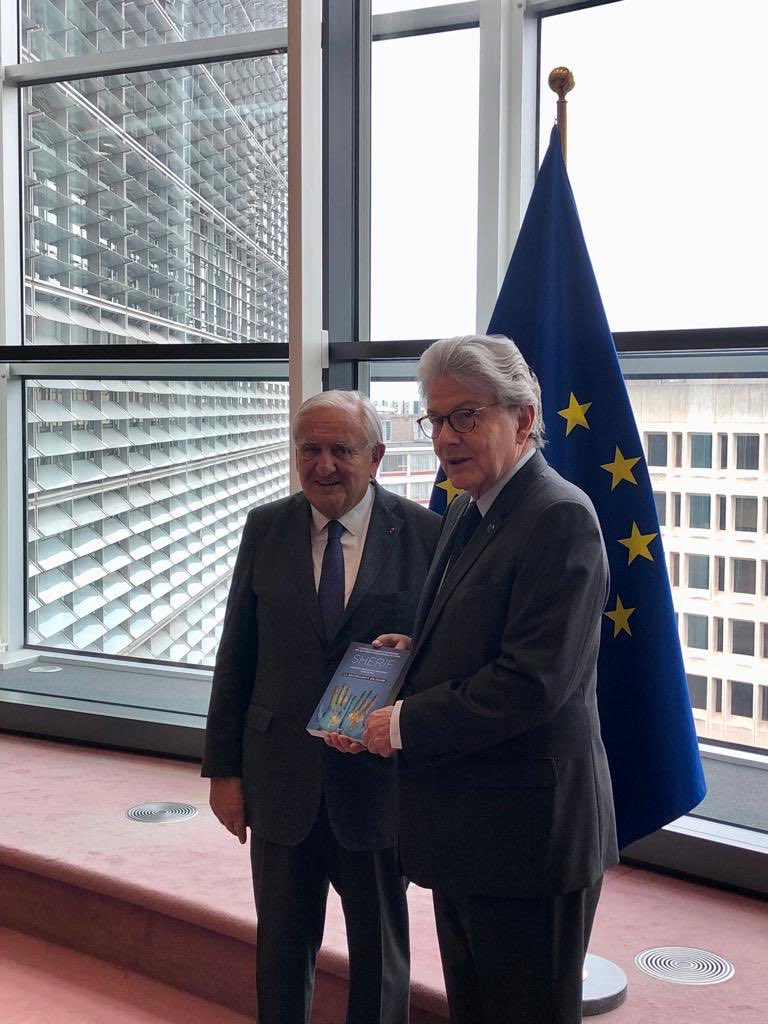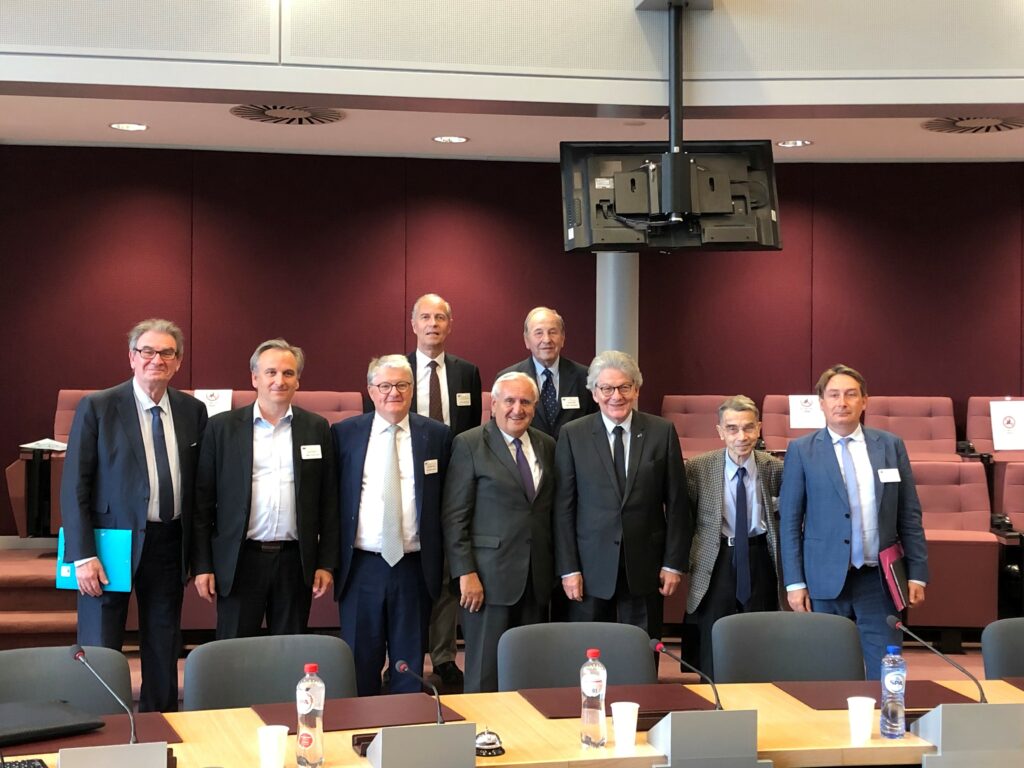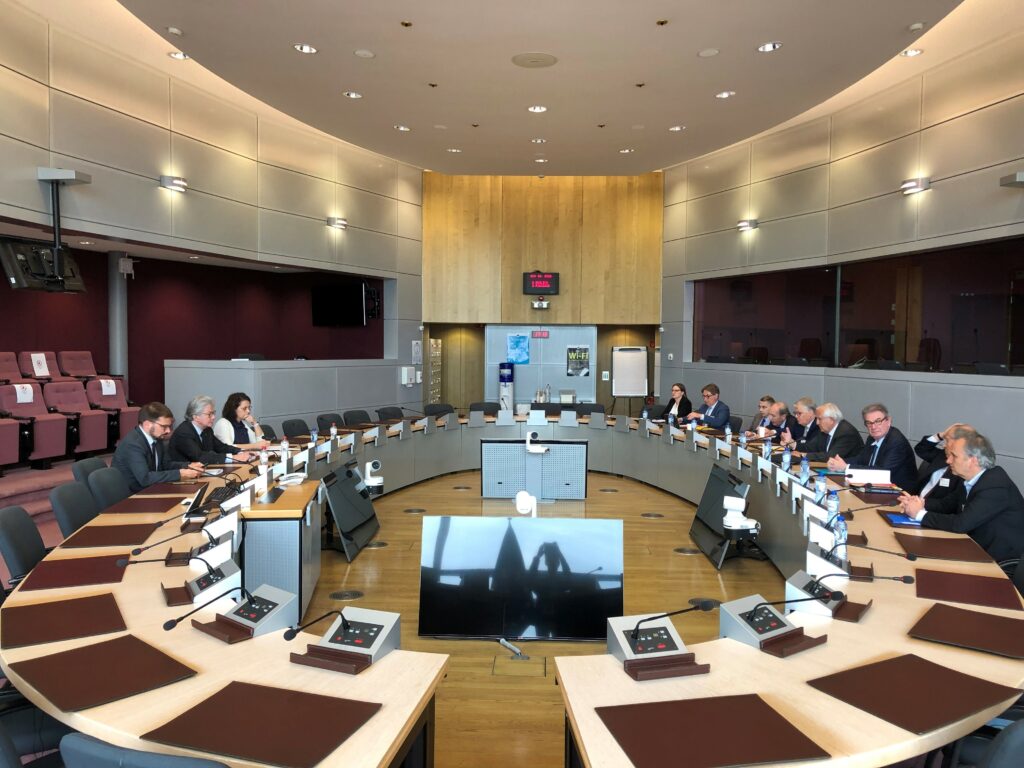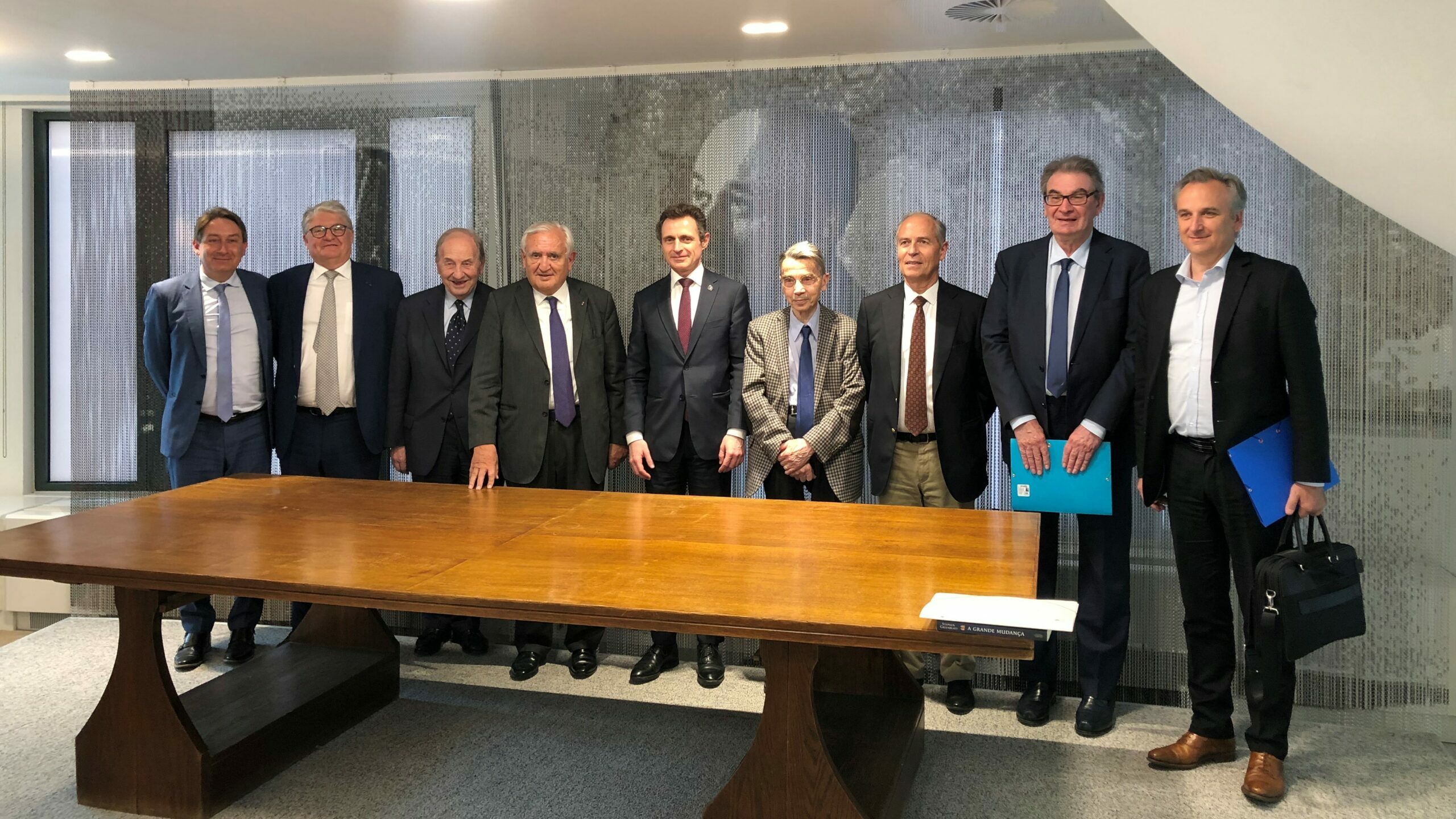On 10 May 2022, The Bridge Tank joined a study trip to Brussels that met with European Commissioner Thierry Breton among others. The study trip was organised by the Prospective and Innovation Fondation (PIF) and its chairman Jean-Pierre Raffarin, former Prime Minister of France. The Bridge Tank was represented by Joël Ruet and Philippe Coste, respectively chairman and board member of the organisation.
This study trip on the subject of European sovereignty and autonomy in the face of global pressures and tensions consisted of five interviews with high-ranking EU officials and researchers. The study trip’s delegation met with Laurence Graff, Head of Unit at the European Commission’s Directorate-General for Climate Action (DG CLIMA), with two representatives of the Belgian think tank EGMONT – Royal Institute for International Relations, with Ambassador Philippe Léglise-Costa, Permanent Representative of France to the EU, with Denis Redonnet, Deputy Director-General of the Directorate-General for Trade at the European Commission, and finally with Thierry Breton, European Commissioner for the Internal Market.
The Bridge Tank is pleased to publish the report of this day in Brussels (a more detailed report is available in French).
Commissioner Thierry Breton – The balance of power and geopolitics of the internal market: towards stronger regulations and value chains
Recent crises have revealed weaknesses in Europe’s balance of power with China and the United States. According to Thierry Breton, de-globalisation is impossible today and certain dependencies are bound to persist (e.g. rare earths and semi-conductors). Rather than establishing European ‘sovereignty’, we need to establish a balance of power based on the size of the European continent to ensure relative autonomy and the ability to choose and defend ourselves.
The EU will rigorously enforce its rules and interests against the GAFAs and multi-national technology companies, without any possibility of extraterritoriality, with the Digital Market Act and the Digital Service Act setting out the rules for access to the European market.
More generally, the Commission has in recent years assessed the weaknesses of value chains in each critical sector (e.g. batteries, semi-conductors, lithium, rare earths). It has now become impossible to reason on a country-by-country basis within the EU, and ecosystems and regulatory approaches need to be developed at continental level. For lithium, for example, refining capacity must be developed, as the continent has sufficient lithium resources.



DG CLIMA, Laurence Graff – European climate policy and ambitions: carbon neutrality and energy sovereignty
According to Laurence Graff, Head of Unit at the Directorate-General for Climate Action (DG CLIMA), European climate policy is now of both national and international interest. It was in 2008, during the French Presidency, that the first climate-energy package was adopted. This paved the way for European leadership on environmental issues, which has produced results both in the Member States and internationally. All this was made possible by a differentiated approach and concrete solidarity through various European funds. The European Commission (EC) pays close attention to support mechanisms for climate vulnerability. This was illustrated in 2022 by the creation of a Social Fund for Climate. But the climate issue is also a strategic one, encompassing issues of innovation and international competitiveness.
According to Frans Timmermans, EC VP, the Green Pact represents a new growth strategy, with issues of support and management of economic transition for certain sectors, by strengthening the industries of the future and supporting those in difficulty. The aim is for Europe to become the first carbon-neutral continent, a vision that is more relevant than ever given the current need for energy sovereignty. This concern is also at the heart of the EC’s RePowerEU plan, revealed on 18 May 2022.
EGMONT – The Royal Institute for International Relations: European global power and the balance of power
After the financial and migration crises of the past 20 years, the European Union seemed to have emerged weakened and with a sense of unfinished business. The crises caused by COVID-19 and the war in Ukraine have enabled strong and irreversible progress to be achieved. Although there are difficulties in developing a common diplomatic position, particularly with the risk of a rift in the position of the 27 on the sanctions imposed on Russia, the French Presidency’s proposals aimed at making the Union a global power are coming to fruition. This is made possible in particular by the changing position of Germany, whose current government is proving to be more European than its predecessors, open to variable-geometry advances towards closer cooperation. Egmont is seeing positive signs in Franco-German relations.
During the exchanges between the various participants in this meeting, the question of the balance of power between the EU and Beijing once again found itself at the heart of discussions. Although China has agreed to grant European groups considerable financial margins, a change of course on the part of the Chinese authorities could seriously weaken these companies. The European project must necessarily include a strong position in relation to powerful countries and encourage a union of democracies. This position is reflected in the EU’s continental balance of power vis-à-vis China, particularly in terms of trade relations, where the Union has already indicated its intention to rebalance the balance of power. According to Egmont, European economic power is now beginning to assert itself primarily through the normative power of the European market.
Ambassador Léglise-Costa – European dynamics in response to present and future crises
The exchange session with Ambassador Philippe Léglise-Costa, Permanent Representative of France to the EU, addressed the current dynamics in the common strategy of the European Union.
According to Ambassador Léglise-Costa, the evolution of the German position is particularly notable, a finding similar to that of the Egmont Institute. Faced with the various crises that have hit the continent in recent years, Germany has taken strong decisions characterized by greater openness to common concerns. This contrasts with a more German-centric approach in the past. Beyond the conceptual, the Franco-German tandem has come out strengthened. Germany’s support for the French presidency made it possible to vote on the text on the reciprocity mechanism in public procurement. As the text on subsidies to state-owned enterprises is also advancing, it will contribute to rebalancing the balance of power with countries like China.
According to Ambassador Léglise-Costa, the European position in terms of defense strategy must now progress and encourage the EU to re-equip itself in order to reduce its dependence on the United States, if only because of the risk of political change in US.
DG TRADE, Denis Redonnet – Open strategic autonomy and economic cold war
The European Union is now emerging from an era of all-out free trade agreements, which made it the jurisdiction with the greatest amount. The approach has now changed, and so have the issues of economic integration, to focus on an approach of “open strategic autonomy”. This approach intends to continue to reap the benefits of openness, while working to rebalance the situation to counterbalance the practices of certain economic partners.
The crises facing the EU today are generating increased demands for precaution and protectionism. These tendencies towards protectionist withdrawal can be seen in the EU’s southern neighbourhood in the implementation of agreements to replace European imports with local products. Other types of difficulties encountered today concern the distortions of global competition linked to Chinese state capitalism, which generates distortions around the cost of capital and the system of state-owned enterprises. In the face of this, it has to be said that the rules of the World Trade Organisation (WTO) do not allow for good governance of these practices. This partly explains the withdrawal of the United States from this system and the illegal tariffs from the WTO’s point of view that the US and China are now imposing on each other. These practices are undermining the dispute settlement system, which was one of the most advanced mechanisms for international governance. Although the 25 member countries of the WTO (including China) have set up an alternative system, the absence of the United States from the WTO reform process renders any EU-led efforts to reform futile.
Russia’s invasion of Ukraine required a rapid response and adaptation on the part of the EU. In economic terms, this is illustrated by the speed with which the first five packages of sanctions were put in place. In terms of exports, 25% of EU and G7 exports to Russia are under sanctions. This strategy is undoubtedly part of a medium- to long-term cold war, and will undermine and degrade Russia’s industrial potential in the medium term. Economic and commercial relations are being used to leverage power. The United States is also sending out signals that it could do the same to China, as it had begun to do to the Chinese telecoms giant Huawei and is now doing to Russia. Such an extension to the whole of China would have gigantic consequences.
Conclusion
As the Prospective and Innovation Foundation noted after the trip, “the international climate continues to deteriorate dangerously, but the Union is responding well, in particular by expressing the idea of sovereignty in all its forms”.

